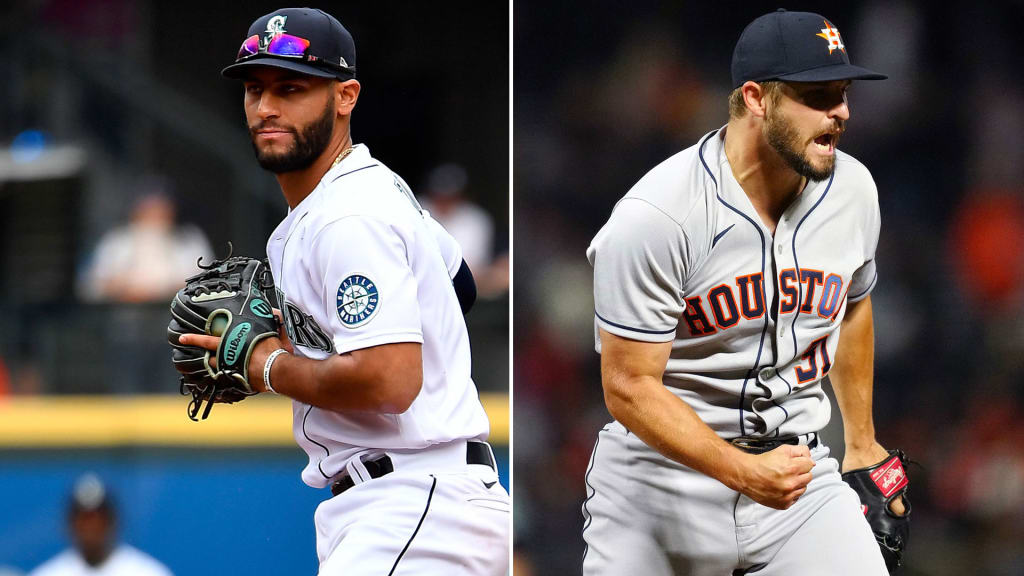
HOUSTON -- Abraham Toro had been living out of a suitcase until Thursday night, with a few quick visits to retail clothing stores on various Mariners road trips simply to hold him over until he could return to his Houston apartment and gather his belongings.
Such is the fast-paced life in the Majors, but it’s hardly an inconvenience for the 24-year-old infielder, who has been brimming since a July 27 trade that brought him to the Mariners -- and for good reason, beyond his naturally positive-outlooking personality. Toro entered Saturday’s game against his former teammates hitting .309/.398/.481 (.879 OPS) and had reached base in all but one of the 22 games during this stretch.
“It was just like an easy [transition],” Toro said. “So I think just mentally, I was in a good place; physically, too -- playing every day, it was easier to make some adjustments. So, it was an easy [transition]. I think that helped me just keep going and keep hitting. When you're playing every day, it's easier. … You can adjust quicker than when you're not playing.”
Toro returned to the very venue where he grew up on Friday, when the Mariners visited Minute Maid Park for the first time since the trade, chatting with former teammates and other Astros personnel. And while he’s grateful the Astros made him their fifth-round Draft pick in 2016, he’s cognizant enough to realize that his path to more consistent playing time is in Seattle -- where he is no longer blocked around the infield by Jose Altuve, Carlos Correa and Alex Bregman.
Playing every day has also allowed Toro to more proactively make the adjustments suggested by infield coach Perry Hill since he transitioned to second base, a position he’d played sparingly but one where the Mariners have been impressed by his development. Specifically, Toro has made strides with his multi-angle throws on double-play relays to Gold Glove Award-winning shortstop J.P. Crawford.
“We didn't know how well he would adjust to second base,” Mariners manager Scott Servais said. “He had not played much second base -- and I really [give credit] to him, how he's worked and the things he's focused on. And you see it showing up in games -- whether it's the different plays and the feeds [to] second base, to turning the double play. The different things like that, he's really gotten much more comfortable with.”
Toro has been Seattle’s most consistent hitter besides red-hot Ty France, both of whom will be part of Seattle’s long-term infield core. Where each ultimately lands long term on the diamond remains unclear, with the status of third baseman Kyle Seager’s possible free agency this offseason and first baseman Evan White recovering from hip surgery.
That in itself is precisely why Mariners general manager Jerry Dipoto executed the trade for Toro despite it leaving many in Seattle’s clubhouse upset with what it cost -- the big exit being reliever Kendall Graveman, who has been just as lights-out for Houston as he was for Seattle, with scoreless outings in six of his seven appearances since the deal -- with just five hits allowed and a 32.2 percent strikeout rate.
Graveman, who was in tears hours after the trade, has moved on and focused on pitching with his new teammates in a pennant race.
“I know going back [to Seattle in] the future, [I will] always [have] memories ... [I will] show up and reminisce -- [especially] being in that ballpark and being around people that are still going to be on that staff for years to come and players that [I] played with,” Graveman said. “That's always going to be there. And those thoughts and memories will pop up when I go to Seattle. But once I left Seattle, it was, ‘Hey, this is my job now. I've got to go out and help the Houston Astros.’”
But the 30-year-old, who had such mutual admiration for his Mariners teammates, is also keeping the door open when he heads into free agency this offseason. A return seems unlikely, given the Mariners’ bevy of bullpen arms under club control and the fact Graveman will likely net a multiyear deal at a far higher rate than his $1.25 million contract for 2021. But he’ll never say never, and he indicated as much to assistant GM Justin Hollander.
“I mentioned, ‘Hey, I will not rule out any possibility,’” Graveman said. “So no hard feelings, Justin. Both him and I have had a good relationship, and I think that mutual respect for each other is still there. And if they would ever reach out, we would always be available to have a conversation. And that goes for any team that I've been involved with. I always try to keep that mindset -- and not just for my own personal sake. But I just think it's smart [for] me as a player to never burn any bridges and kind of keep that avenue available.”
To that end, 25 days after the dust settled on the deal, it’s -- so far, at least -- proven to be, objectively, a benefit for both sides. The Mariners desperately needed an upgrade at second base after receiving just a .191/.260/.354 slash line of production at the position (minus-0.3 WAR), tied for the second-worst in baseball. The Astros desperately needed relief help -- with the club owning a 4.15 bullpen ERA before the trade and a 2.47 mark since, the Majors’ second-best mark over that stretch.
And don’t forget about the other pieces: Joe Smith, who has held opponents scoreless over 10 mid-to-low-leverage outings for Seattle; and Rafael Montero, who is currently on the 10-day IL with right shoulder discomfort but delivered four appearances with just one unearned run allowed beforehand for Houston.
There are still six weeks left in the regular season -- and possibly more -- should either, or both, of these clubs reach the postseason. Last month’s trade was one each felt they needed to execute to keep them in this year’s hunt -- and beyond.
